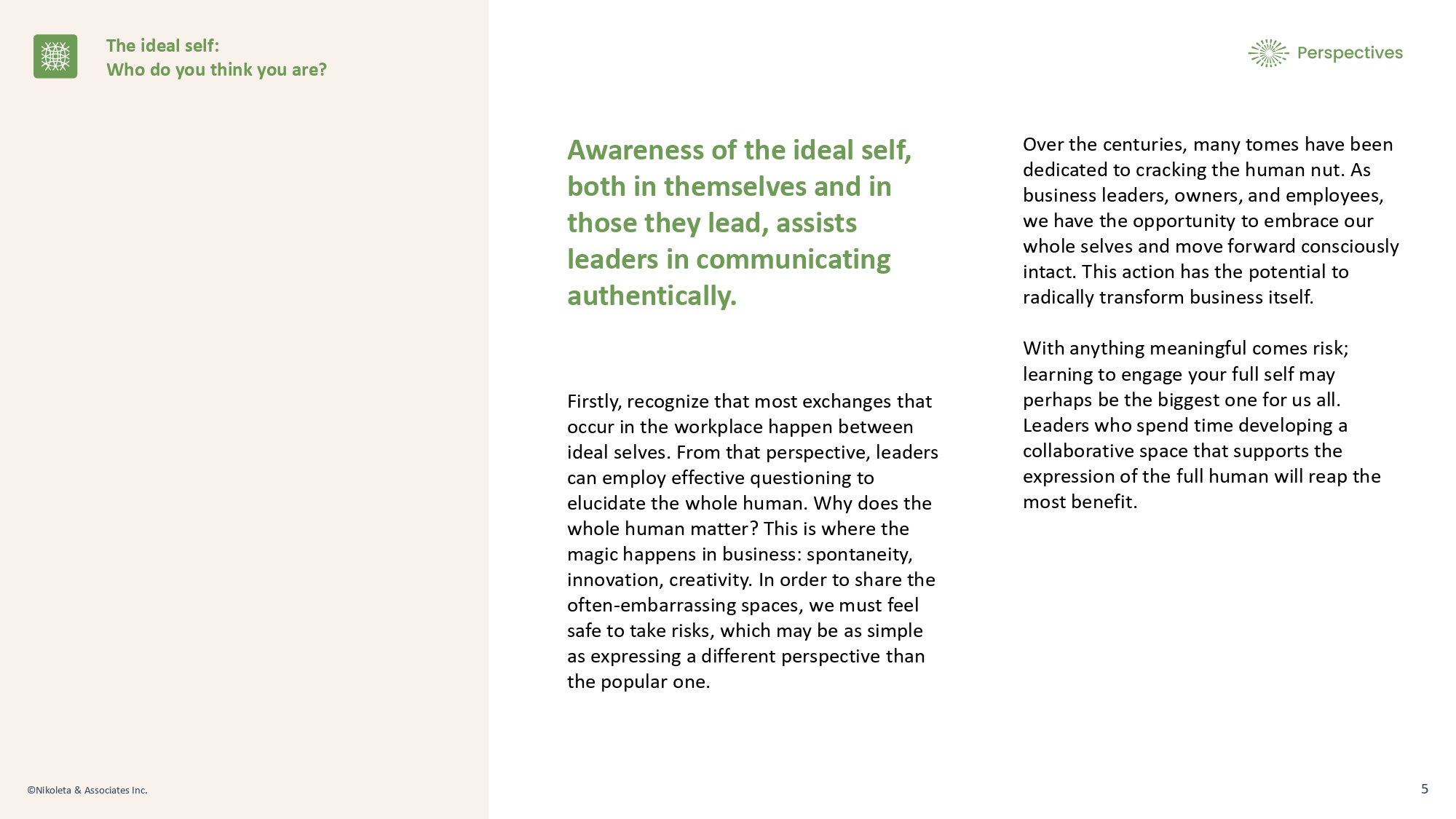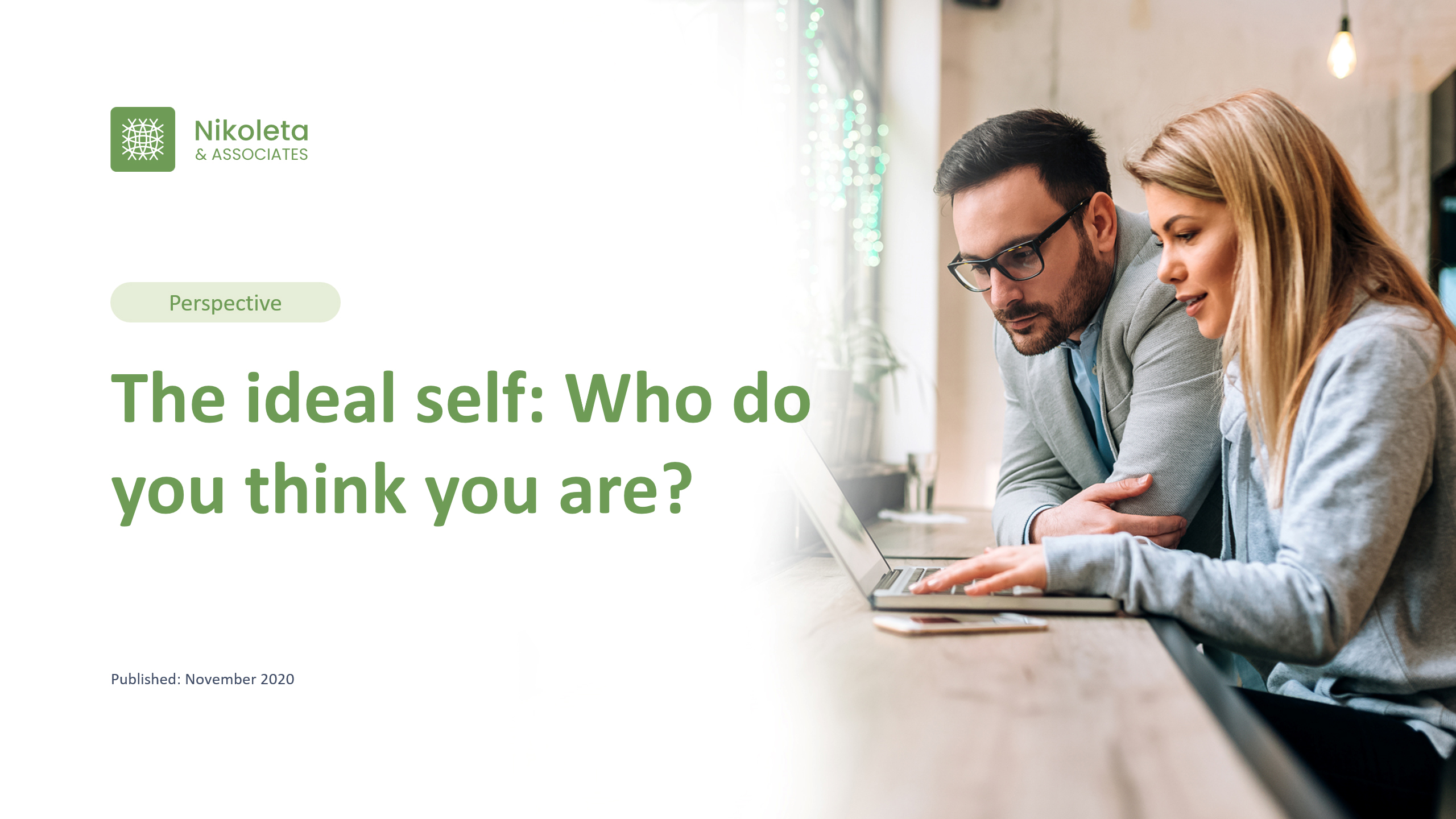Perspective
The ideal self: Who do you think you are?


As humans, we rarely see our full selves. In fact, most of us operate from an ideal self, an imagined version of ourselves.
Large areas of experience remain unavailable to us for our entire lives, not because we don’t experience them but because the experiences themselves do not match the idealized image we have of ourselves.
Often, we approach life from a role, then generate a self to fulfill that role; once the role is in place, we tend to experience ourselves almost unilaterally through it. For example, we may have a Work Self, a Husband Self, a Friend Self, a Private Self, a Parent Self, etc. Sometimes, considerable discrepancies exist between these fragmented selves and the rest of our personhood. Why does this matter in business?
The answer is: In life, as in business, that which is ignored rarely goes away. In the business world, most of us are unaware that we operate from this ideal self. This self is essentially a three-pronged mental projection, comprised of the following:
a) who we think we are;
b) how we think the world should be; and
c) who we want to be.
The ideal self tends to be rosy, stylized, judgmental, and often hypocritical. It rejects everything that does not mirror the idealized image, which includes many aspects of the human whole.
When we approach work from the perspective of the ideal self, we act as though we are perfect. But we all understand, conceptually, that we are not. We don’t know the future and we are not in control of life. Rather, at the highest level – we are life, operating within it. Thus, we can actively shape and respond to life. Plans will fail and succeed. We drop the ball and catch the ball. Unless we adopt a learning approach – which is impossible if we believe we are already perfect and already know everything – the growth possibilities made available to us by life through business remain out of reach.
A number of work-related tensions stem from two ideal selves clashing.
For example, when we judge others and find another person in our view “lacking or deficient,” that is the ideal self projecting a perceived weakness onto another human being. The ideal self sees itself as someone who doesn’t make mistakes, a human with no human qualities, so to speak. Both the perceived weakness and the judgment always originate in us. So, why does it exist?
Compartmentalization is one of the most dangerous beliefs that businesses hold and offers one explanation for the utility of the ideal self. Ultimately, many of us will attempt to compartmentalize our experiences in order to function at work. Because business is structured as an idealized world where we are “perfectly performing,” the elements of ourselves that are awkward or embarrassing (to our ideal selves) are often kept out of the business world through a myriad of coping mechanisms.
When we are successful at work, the ideal self takes full credit. When we are not successful at work, the ideal self deflects and assigns blame. This is why many valuable learnings remain lost to many of us. And with the pace of change, we really want to mine our learnings.
In our work, we find that many businesses are undergoing a profound shift towards recognizing the human at the center of all business. An important distinction: when we say human, we mean the whole human. This includes the ideal self – loving, generous, collaborative – and the self or selves that we reject or deny – hypocritical, angry, or frustrated.
Awareness of the ideal self, both in themselves and in those they lead, assists leaders in communicating authentically.
Firstly, recognize that most exchanges that occur in the workplace happen between ideal selves. From that perspective, leaders can employ effective questioning to elucidate the whole human. Why does the whole human matter? This is where the magic happens in business: spontaneity, innovation, creativity. In order to share the often-embarrassing spaces, we must feel safe to take risks, which may be as simple as expressing a different perspective than the popular one.
Over the centuries, many tomes have been dedicated to cracking the human nut. As business leaders, owners, and employees, we have the opportunity to embrace our whole selves and move forward consciously intact. This action has the potential to radically transform business itself.
With anything meaningful comes risk; learning to engage your full self may perhaps be the biggest one for us all. Leaders who spend time developing a collaborative space that supports the expression of the full human will reap the most benefit.















